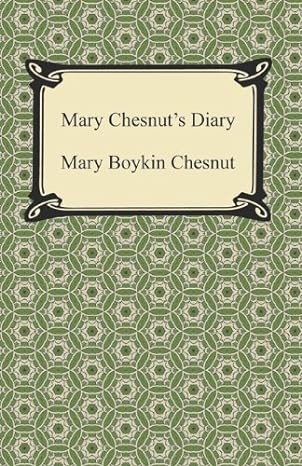Mary Boykin Chesnut
Mary Boykin Chesnut was born on March 31, 1823, on her family's plantation near Stateburg, South Carolina. Raised in the antebellum South amidst the privileged world of plantation life, Chesnut received an education that fit her social status and was well-versed in literature, history, and politics.
In 1840, Mary Boykin married James Chesnut Jr., a wealthy lawyer and plantation owner who would later become a prominent figure in Confederate politics. Their marriage brought Chesnut into the heart of Southern elite society and positioned her at the nexus of political power in the antebellum South.
As the wife of a Confederate senator and advisor to President Jefferson Davis, Chesnut was privy to the inner workings of the Confederacy's political and military leadership. Her keen intellect and sharp wit made her a respected confidante and advisor to many of the South's most influential figures.
Chesnut's most enduring contribution to history came in the form of her diary, which she began keeping shortly before the outbreak of the Civil War. In her diary entries, Chesnut provided a candid and insightful account of life in the Confederacy, offering intimate portraits of the people and events that shaped the course of the war. Her keen observations and vivid prose captured the complexities of Southern society and the profound impact of the war on its citizens. Her writings shed light on the complexities of race, class, and gender in Southern society, as well as the profound transformations wrought by the Civil War.
December 21st. - Mrs. Charles Lowndes was sitting with us to-day, when Mrs. Kirkland brought in a copy of the Secession Ordinance. I wonder if my face grew as white as hers. She said after a moment: "God help us. As our day, so shall our strength be." How grateful we were for this pious ejaculation of hers! They say I had better take my last look at this beautiful place, Combahee. It is on the coast, open to gunboats.
February 28th. - In the drawing-room a literary lady began a violent attack upon this mischief-making South Carolina. She told me she was a successful writer in the magazines of the day, but when I found she used "incredible" for "incredulous," I said not a word in defense of my native land. I left her "incredible." Another person came in, while she was pouring upon me her home troubles, and asked if she did not know I was a Carolinian. Then she gracefully reversed her engine, and took the other tack, sounding our praise, but I left her incredible and I remained incredulous, too.
March 1st.-Dined to-day with Mr. Hill from Georgia, and his wife. After he left us she told me he was the celebrated individual who, for Christian scruples, refused to fight a duel with Stephens. She seemed very proud of him for his conduct in the affair. Ignoramus that I am, I had not heard of it. I am having all kinds of experiences. Drove to-day with a lady who fervently wished her husband would go down to Pensacola and be shot. I was dumb with amazement, of course. Telling my story to one who knew the parties, was informed, "Don't you know he beats her?" So I have seen a man "who lifts his hand against a woman in aught save kindness."
Brewster says Lincoln passed through Baltimore disguised, and at night, and that he did well, for just now Baltimore is dangerous ground. He says that he hears from all quarters that the vulgarity of Lincoln, his wife, and his son is beyond credence, a thing you must see before you can believe it. Senator Stephen A. Douglas told Mr. Chesnut that "Lincoln is awfully clever, and that he had found him a heavy handful."
I have seen a negro woman sold on the block at auction. She overtopped the crowd. I was walking and felt faint, seasick. The creature looked so like my good little Nancy, a bright mulatto with a pleasant face. She was magnificently gotten up in silks and satins. She seemed delighted with it all, sometimes ogling the bidders, sometimes looking quiet, coy, and modest, but her mouth never relaxed from its expanded grin of excitement. I dare say the poor thing knew who would buy her. I sat down on a stool in a shop and disciplined my wild thoughts. I tried it Sterne fashion. You know how women sell themselves and are sold in marriage from queens downward, eh? You know what the Bible says about slavery and marriage; poor women! poor slaves! Sterne, with his starling - what did he know? He only thought, he did not feel.
April 8th - Suddenly loud shooting was heard. We ran out. Cannon after cannon roared. We met Mrs. Allen Green in the passageway with blanched cheeks and streaming eyes. Governor Means rushed out of his room in his dressing-gown and begged us to be calm. "Governor Pickens," said he, "has ordered in the plenitude of his wisdom, seven cannon to be fired as a signal to the Seventh Regiment. Anderson will hear as well as the Seventh Regiment. Now you go back and be quiet; fighting in the streets has not begun yet."
Following the end of the Civil War and the collapse of the Confederacy, Mary Boykin Chesnut and her husband faced the task of rebuilding their lives in the war's aftermath. The loss of their wealth and social status dealt a devastating blow to the Chesnuts.
Chesnut's diary continues to be studied by historians and scholars, offering a rich source of information and interpretation on the Civil War.



